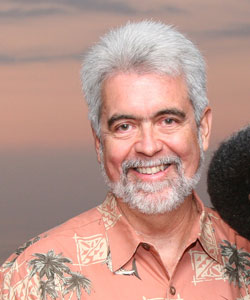Council Member Profiles
Reserve Advisory Council member profile

Rick Gaffney
2001 – present
"It has been an honor and a pleasure to work alongside some of the brightest and most dedicated scientific minds, Hawaiian cultural practitioners, and ecosystem managers imaginable, for the last two decades. "
– Rick Gaffney, Recreational Fishing Seat, Secretary
Q: What drew you to participate in the NWHI Coral Reef Ecosystem Reserve Advisory Council?
A: In the mid-1990’s, I became actively involved with sport fishing and dive tourism at Midway, which gave me the rare privilege of visiting regularly and becoming intimate with the atoll’s marine environment. My experience at Midway, and with marine protected areas in the main Hawaiian islands, made me want to share my knowledge and experience, as one of the original members of the council.
Q: What are your personal thoughts on the place and why it deserves such dedicated protection?
A: My lifetime in Hawaii, and awareness of the high degree of endemism and extraordinarily healthy ecosystems of the Northwestern Hawaiian Islands, confirm that these remote islands deserve protection in perpetuity.
Q: What do you see as the Reserve Advisory Council’s greatest achievement during the time you have been directly involved?
A: Contributing to the process of securing the IUCNs rare World Heritage listing which recognizes the Northwestern Hawaiian Islands’ natural and cultural values.
Q: As a member of the council, what is one of your most memorable experiences?
A: On a Reserve Advisory Council tour of a Coast Guard cutter, the Chief Boatswain described their many fishing successes in the Northwestern Hawaiian Islands. I may have been the only member of the council who understood breaking up the monotony of a long voyage and providing fresh fish for the crew.
Q: What do you see as the biggest challenges facing the council and/or monument today?
A: The presumption by some that economics should trump science, that absolute protections are not necessary, that fishing, seabed mining, or other invasive practices won’t do enough damage to make a difference.
Q: Why should people care about protecting the monument?
A: It is an absolutely unique place; protected in part by its location, with the highest degree of endemism of any islands on earth. It is uniquely positioned to weather climate change, it has deep cultural significance to the Hawaiian people, and has an important historical record.


